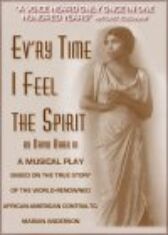Synopsis
Ev'ry Time I Feel the Spirit
 $9.99
$9.99
Published by Dramatic Publishing
5 Male 4 Female
Taking place on the eve of the First Annual World Negro Arts Festival in Dakar, Senegal, 1966, this play with music paints a sweeping portrait of Anderson as a complex artist and troubled woman moving slowly toward middle age and the evolving image of black people during the precarious Civil Rights Movement
Born in Philadelphia in 1897, Anderson managed the nearly impossible feat of carving out a legendary career as a classical concert singer
She courageously fought institutional racism and her own insecurities and fears to be recognized on her own terms within classical musical circles
Often infuriating others by grandly referring to herself in the third person, she was sometimes portrayed as a royal diva of the first order
But Anderson is seen in Ev'ry Time I Feel the Spirit as a very human artist of the first order with deep-seated feelings, resentments and a lifetime of regrets
Through classical music and African dance, the play chronicles the latter half of her career through a series of dramatic vignettes showing the complexities of this very important 20th-century artist who bravely defied a segregationalist ban against her 1939 concert recital in Washington, D.C., when she sang on the steps of the Lincoln Memorial that Easter Sunday
The play culminates with Anderson coming to terms with herself, her place in history and proving to the world that she was more - and less - than a saintly American icon
Unit set - Approximate running time: 2 hours